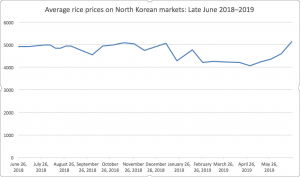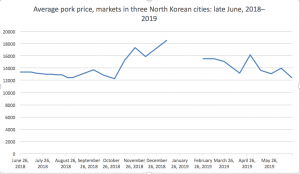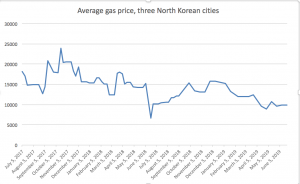By: Benjamin Katzeff Silberstein
Looking at the latest figures from Daily NK’s market price data index, there are a few interesting developments to note.
First, rice prices have gone up quite a bit over the past few weeks. This in itself not dramatic or unusual. After all, rices prices tend to climb during the lean season closest to the next harvest, between May and September (roughly). But if the climb continues, that could be the markets finally catching up to the supply shortages. (Though, as I’ve written about numerous times, we can’t read the calm of the market prices as a refutal of the food shortage claims. It’s more complicated than that.)
As the graph shows, the latest price observation (June 25, 2019) is slightly higher than the closest equivalent from last year (June 26, 2018). It’s not by very much – a price difference of 227 won isn’t what I would call significant – but still, prices may continue to climb from now and onward. We just don’t know.
More significant and interesting, however, is that prices have climbed by quite a bit and quite quickly over the last couple of months. On April 30th, Daily NK reported an average market price of 4070 won per kg. On June 25, 2019, that same price was 5140. That’s an increase of 26 percent in less two months.
In the grand scheme of things, it’s not a massively high price. But the quick increase is notable, and it’ll be important to keep an eye on the future price trajectory to see if it’s part of a longer trend.
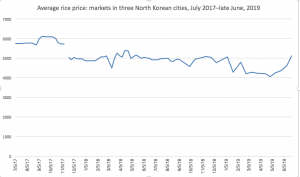
Average rice prices on markets in three North Korean cities, July 2017–late June, 2019. Data source: Daily NK.
Note that the price hump to the left is from September 2017, and prices tend to be higher later in the fall.
Second, corn prices have also climbed during the same period. Corn, it can reasonably be assumed, is an inferior substitute good for rice – in other words, its less popular cousin. When rice gets more expensive, people should logically buy more corn. Corn prices have also climbed in the past few weeks, but not to historically significant highs.
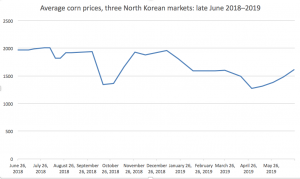
Average corn prices on markets in three North Korean cities, July 2017–late June, 2019. Data source: Daily NK.
Third, pork prices have declined quite steeply over the last two months. Not to historical lows, at least not yet, but still.
If one wanted to fit this into a broader narrative of food shortages, here’s how it could be done: if people need to spend more of their income on staple foods such as rice, they have less to spend on more luxurious foods such as pork. Subsequently, prices should decline.
Fourth, gas prices, too, have dropped, and very steeply, over the past few weeks. This price drop is most likely caused by seasonal factors (which makes sense given the summer weather), since the same drop occurred last year too. But it could also be that China has increased supply with the improvement of relations with North Korea. In any case, it does look like gas prices are back in their normal range, and a drop this steep over time certainly makes things easier for a wide range of economic sectors in the country.
In sum, the higher rice price may be part of a longer-term trend, and it shouldn’t be surprising if the seasonally normal increase of the summer and fall months ends up being higher than usual. As of now, it’s not a dramatic increase, but for those many North Korean consumers already living on thin margins, it may be quite problematic.
